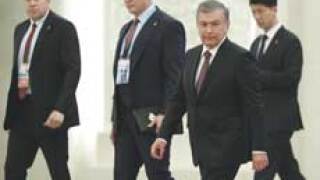Uzbekistan
-
The political uncertainty triggered by the decision to re-run the municipal elections in Istanbul has not dented international lenders’ appetite for financing Turkey’s banks, market participants tell GlobalMarkets
-
A Ukrainian bank believes it can overturn a court ruling against its nationalisation that was seen as good news for the oligarch who used to own it and who is a supporter of the incoming president.
-
As Uzbekistan takes its first steps towards opening up to international investors, Europe and US are trailing behind their Russian and Chinese counterparts.
-
Emerging markets investors are looking ahead to a series of privatisations in Kazakhstan following the economic reforms unveiled by outgoing president Nursultan Nazarbayev that should be implemented by his successor
-
After years of isolation, Uzbekistan has started to forcefully address its economic challenges and exploit its inherent advantages in a way that offers the potential to make this resource-rich market a stronger player in the global economy
-
Four decades after declaring independence, a successful Eurobond issue and major reforms show Uzbekistan is finally growing up and engaging with the world on its own terms
-
After being off limits to foreign investors for many years, Uzbekistan has raced to catch up for lost time by seeking investments by European banks and international financial institutions
-
After decades of self-imposed isolation, Uzbekistan is embarking on a range of projects with the help of Chinese assistance — and finance — to slowly start to stitch a recently remote country back into the global economy
-
Since late 2016, Uzbekistan has embarked on large-scale institutional, economic and social reforms under President Mirziyoyev’s administration.
-
Uzbekistan is now the focus of emerging and frontier markets, as international investors, buoyed by the success of Kazakhstan’s privatisation programme, clamber to be in the first wave of opportunities the country is to offer, writes Sam Kerr.
-
JPM securitization banker leaves — Goldman Brexiter quits for politics — Balax enrols in fintech course
-
After six months running the Uzbekistan’s newly created debt management office, ex-HSBC DCM banker Odilbek Isakov has become the country's deputy finance minister.










